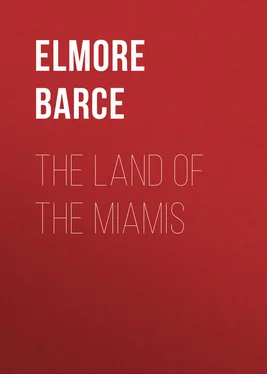Elmore Barce - The Land of the Miamis
Здесь есть возможность читать онлайн «Elmore Barce - The Land of the Miamis» — ознакомительный отрывок электронной книги совершенно бесплатно, а после прочтения отрывка купить полную версию. В некоторых случаях можно слушать аудио, скачать через торрент в формате fb2 и присутствует краткое содержание. ISBN: , Жанр: foreign_antique, foreign_prose, Историческая проза, на английском языке. Описание произведения, (предисловие) а так же отзывы посетителей доступны на портале библиотеки ЛибКат.
- Название:The Land of the Miamis
- Автор:
- Жанр:
- Год:неизвестен
- ISBN:http://www.gutenberg.org/ebooks/30244
- Рейтинг книги:4 / 5. Голосов: 1
-
Избранное:Добавить в избранное
- Отзывы:
-
Ваша оценка:
- 80
- 1
- 2
- 3
- 4
- 5
The Land of the Miamis: краткое содержание, описание и аннотация
Предлагаем к чтению аннотацию, описание, краткое содержание или предисловие (зависит от того, что написал сам автор книги «The Land of the Miamis»). Если вы не нашли необходимую информацию о книге — напишите в комментариях, мы постараемся отыскать её.
The Land of the Miamis — читать онлайн ознакомительный отрывок
Ниже представлен текст книги, разбитый по страницам. Система сохранения места последней прочитанной страницы, позволяет с удобством читать онлайн бесплатно книгу «The Land of the Miamis», без необходимости каждый раз заново искать на чём Вы остановились. Поставьте закладку, и сможете в любой момент перейти на страницу, на которой закончили чтение.
Интервал:
Закладка:
"A combination of circumstances makes the present conjuncture more favorable for Virginia, than for any other state in the union, to fix these matters. The jealous and untoward disposition of the Spaniards on the one hand, and the private views of some individuals, coinciding with the general policy of the court of Great Britain, on the other, to retain as long as possible the posts of Detroit, Niagara, and Oswego (which though done under the letter of the treaty, is certainly an infraction of the spirit of it, and injurious to the Union) may be improved to the greatest advantage by this state, if she would open the avenues to the trade of that country, and embrace the present moment to establish it. It only wants a beginning. The western inhabitants would do their part towards its execution. Weak as they are, they would meet us at least half-way, rather than be driven into the arms of foreigners, or be made dependent upon them; which would eventually either bring on a separation of them from us, or a war between the United States and one or other of those powers, most probably the Spaniards."
These remarks coming from the pen of Washington aroused intense interest in Virginia. He did not stop there. On the fourteenth of December, 1784, we see him calling the attention of the president of the old continental congress to these affairs. He urged, "that congress should have the western waters well explored, their capacities for navigation ascertained as far as the communications between Lake Erie and the Wabash, and between Lake Michigan and the Mississippi, and a complete and perfect map made of the country at least as far west as the Miamis, which run into the Ohio and Lake Erie," and he pointed out the Miami village as the place for a very important post for the Union. The expense attending such an undertaking could not be great; the advantages would be unbounded. "Nature," he said, "has made such a display of her bounty in these regions that the more the country is explored the more it will rise in estimation. The spirit of emigration is great; people have got impatient; and, though you cannot stop the road, it is yet in your power to mark the way. A little while and you will not be able to do either." Such were the enlightened and fatherly hopes that Washington thus early entertained of the great west and its struggling pioneers, who were trying to carve out their destinies in a remote wilderness.
No less enlightened were the views of Jefferson. He may be said in truth to be the father of the northwest. When a member of the legislature of Virginia, he had promoted the expedition under George Rogers Clark, which resulted in the conquest of the northwest, and its subsequent cession to the United States under the treaty of 1783. As governor of Virginia he had taken part in its cession to the general government on March first, 1784. "On that same day," says Bancroft, "before the deed could be recorded and enrolled among the acts of the United States, Jefferson, as chairman of a committee, presented a plan for the temporary government of the western territory from the southern boundary of the United States in the latitude of thirty-one degrees to the Lake of the Woods. It is still preserved in the national archives in his own handwriting, and is as completely his own work as the Declaration of Independence." As the profoundest advocate of human rights of his day or time, freeing himself from the narrow spirit of sectionalism, and despising human slavery and its contamination of the institutions of a free people, he proposed the ultimate establishment of ten new states in the territory northwest of the Ohio, a republican form of government for each of them, and no property qualification for either the electors or the elected. "Following an impulse of his own mind," he proposed the everlasting dedication of the northwest to free men and free labor, by providing that after the year 1800 there should be neither slavery nor involuntary servitude in any of them. While Jefferson's plan for the exclusion of slavery was stricken from the ordinance, his noble ideas of freedom were afterwards fully and completely incorporated in the final Ordinance of 1787, whereby "neither slavery nor involuntary servitude, in the said territory, otherwise than in the punishment of crime, whereof the party shall have been duly convicted," should ever be permitted. This ordinance, through the predominating influence of Virginia and her statesmen, was passed by the vote of Georgia, South Carolina, North Carolina, Virginia, Delaware, New Jersey, New York and Massachusetts, and afterwards ratified by the legislature of Virginia who had to consent thereto to give it full force.
It is at once apparent that these statesmen and patriots who looked forward to the establishment of free republics in the western domain, based on free labor and equal rights, would never consent that the foundation of these new republics should be laid in blood. The outrages perpetrated on the frontiers of New York, Pennsylvania and Virginia, and on the infant settlements of Kentucky, during the revolution, and all at the instigation of the British, had left behind them a loud cry for vengeance. In fact similar outrages were still taking place daily. The claim was made that under the treaty of peace with Great Britain, that no reservation had been made in favor of any of the Indian tribes, or in favor of their claims to any of the lands they occupied; that under the treaty the absolute fee in all the Indian lands within the limits of the United States had passed to the several states such as Virginia, who had a legitimate claim to them, and later by cession of these states to the general government, and that congress "had the right to assign, or retain such portions as they should judge proper;" that the Indian tribes, having aided Great Britain in her attempt to subjugate her former colonies, and having committed innumerable murders, arsons and scalpings on the exposed frontiers, should now be required to pay the penalty for their crimes; that their lands and hunting grounds should stand forfeit to the government, and they be expelled therefrom. In other words, it was asserted that the government should turn a harsh and stern countenance towards all these savage marauders and drive them by force, if need be, from the public lands.
Towards all these arguments in favor of a hard and uncompromising attitude toward the savage tribes, both Washington and Jefferson turned a deaf ear. They assumed a high plane of mercy and forgiveness towards the red man that must ever redound to their glory. On August 7th, 1789, in a message to the senate of the United States, Washington said: "While the measures of government ought to be calculated to protect its citizens from all injury and violence, a due regard should be extended to those Indian tribes whose happiness, in the course of events, so materially depends upon the national justice and humanity of the United States." These sentiments were reflected in his course of action from the first day of peace with Great Britain. He, together with General Philip Schuyler, said, "that with regard to these children of the forest, a veil should be drawn over the past, and that they should be taught that their true interest and safety must henceforth depend upon the cultivation of amicable relations with the United States." He took the high ground that peace should be at once granted to the several tribes, and treaties entered into with them, assigning them certain lands and possessions, within the limits of which they should not be molested. To avoid national dishonor, he advocated the purchase of all lands occupied by the various Indian tribes as the advance of the settlements should seem to require, thus fully recognizing the Indian right of occupancy. He utterly rejected all ideas of conquest, and as he commanded a powerful influence over all the better minds of that day, his counsels prevailed.
Читать дальшеИнтервал:
Закладка:
Похожие книги на «The Land of the Miamis»
Представляем Вашему вниманию похожие книги на «The Land of the Miamis» списком для выбора. Мы отобрали схожую по названию и смыслу литературу в надежде предоставить читателям больше вариантов отыскать новые, интересные, ещё непрочитанные произведения.
Обсуждение, отзывы о книге «The Land of the Miamis» и просто собственные мнения читателей. Оставьте ваши комментарии, напишите, что Вы думаете о произведении, его смысле или главных героях. Укажите что конкретно понравилось, а что нет, и почему Вы так считаете.












